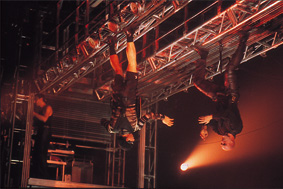


Zulu Time © Emmanuel Valette
This long-standing relationship between Robert Lepage and the new technologies, whether high-tech or low-tech, has enabled him to develop a feeling for their capacity to transcend their intrinsic coldness in order to allow the spectrum of human emotion to reach hitherto unattained levels.
Closer in nature to the permissive cabarets of the 1930s, a free zone in which each artist could either artistically or ideologically contradict all that had gone before, than to the simple kinds of entertainment offered in Las Vegas, Zulu Time will be a place for experiment, failure, success and friction, a laboratory which offers up every possible mode of expression, playing on strong emotions, such as curiosity, suspense, voyeurism, fear or laughter, etc.
Zulu Time will also be a chance to recreate a link between theatrical artists and the electronic arts, because up to now the electronic arts have, as a result of a lack of understanding (lack of vision?), tended to be the domain solely of artists from the world of the image (cinema or the plastic arts) on the basis of the idea that the image is the most obvious expression of such arts, whereas in fact, because of their interactivity, their flexibility vis-à-vis real time, the electronic arts are far removed in spirit from the "backward-looking" time of film and video and from the abstract* time of plastic arts, and are more naturally associated with artists who work in the theatre.
Zulu Time will also, therefore, provide an opportunity to reintroduce the experience, the sense of the collective in these new technologies, which currently tend to concentrate on individual perception through virtual reality, cyberspace and especially the Internet, where the understanding of the collective network still remains highly personal.
(* This idea of abstract time naturally does not take into account the spectator’s development over the passage of time, from his discovery of the work until he comes to fully understand it, or the development of the generations of spectators to come, who will influence the perception of all kinds of art in all kinds of ways.)
Conception and direction: Robert Lepage
Director assistance: Geneviève Lavoie, Nicolas Marois
Co-conception and performance: Jinny Jessica Jacinto, Claire Gignac , Marco Poulin , Rodrigue Proteau
Guest designers:
Louis-Philippe Demers/Bill Vorn - Le procès
Lydie Jean-Dit-Pannel - I'm the sheriff
Granular-Synthesis - FORM-01, FORM-02, FORM-03
Gordon Monahan - Sound Machines
Pierrick Sorin - Dancing Family
Production: Ex Machina
Co-production: Maison des arts de Créteil; Zürcher Theater Spektakel, Zurich; Festival d'automne à Paris
